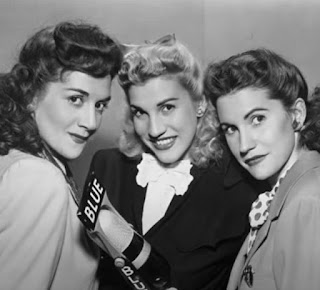In 1945, "Rum and Coca-Cola" became a huge commercial hit for The Andrews Sisters. This great song topped the charts in the United States and also did quite well worldwide. Ironically, some radio stations refused to play the song because it mentioned rum, missing the blatant hints that women were prostituting themselves for the "Yankee Dollar."
So what did The Andrews Sisters think of these risque lyrics laced with social commentary? They later claimed that they had given little thought to the meaning of the lyrics. In my opinion, I can understand that because it had such an innocent, catchy little feel to it.
Patty Andrews shed some light on the song in an interview stating: "We had a recording date, and the song was brought to us the night before the recording date. We hardly really knew it, and when we went in we had some extra time and we just threw it in, and that was the miracle of it."
In under ten minutes The Andrews Sisters had recorded a song that sold seven million units and sat at number one on the Billboard magazine chart for seven weeks.
Maxine Andrews also recalled, "The rhythm was what attracted the Andrews Sisters to 'Rum and Coca-Cola'. We never thought of the lyric. The lyric was there, it was cute, but we didn't think of what it meant; but at that time, nobody else would think of it either, because we weren't as morally open as we are today and so, a lot of stuff—really, no excuses—just went over our heads."
Audio and Lyrics of "Rum and Coca-Cola" by The Andrews Sisters
More History...
The melody was taken from a song that was written by a Venezuelan calypso musician named Lionel Belasco. The lyrics to "Rum and Coca-Cola" were written by Rupert Grant, a Trinidad based musician who went by the interesting performance name: "Lord Invader".
The song was copyrighted in the United States by entertainer Morey Amsterdam and was published with Amsterdam listed as lyricist and Jeri Sullivan and Paul Baron as composers.
The original version of "Rum and Coca-Cola" lamented that U.S. soldiers were debauching local women who "saw that the Yankees treat them nice and they give them a better price." The final stanza described a newlywed couple whose marriage is ruined when "the bride run away with a soldier lad and the stupid husband went staring mad." The Amsterdam version dropped the final part, but also hints that women are prostituting themselves by preserving the Lord Invader chorus which says, "Both mother and daughter - Working for the Yankee dollar."
Note: After the 1945 release of "Rum and Coca-Cola", Belasco and Lord Invader sued for copyright infringement of the song's music and lyrics, respectively. In 1948, after years of litigation, both plaintiffs won their cases.
For more information visit this Wikipedia article about the song.
Swing City Radio: Playing Your Big Band and Swing Music Favorites from the 1930's, 40's and Today! - Big Band Radio Station Broadcasting Online from King of Prussia, PA.







